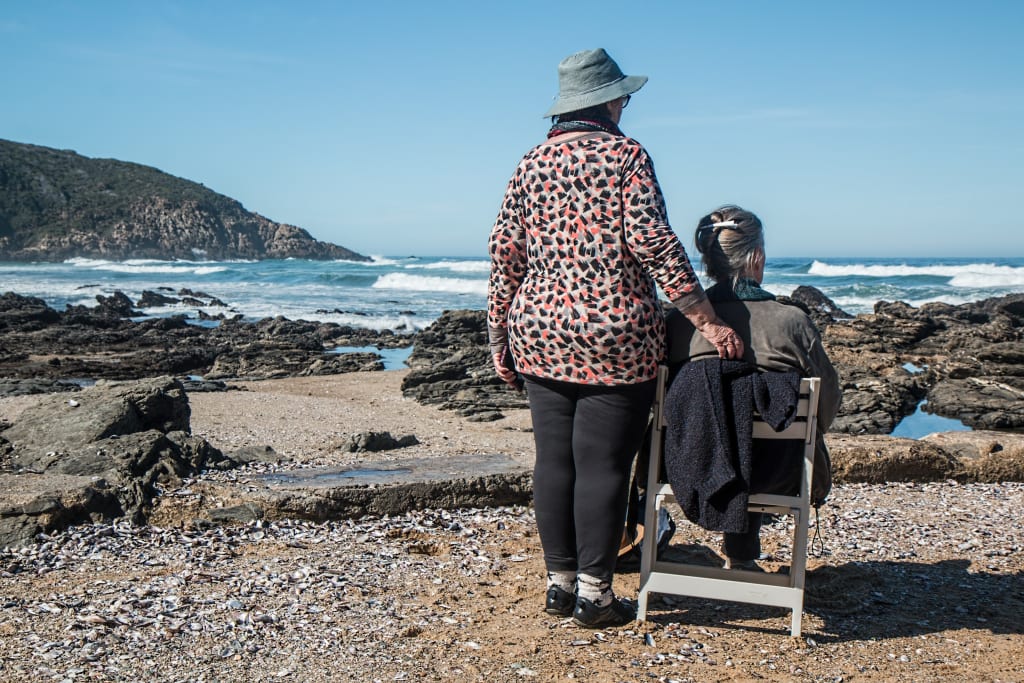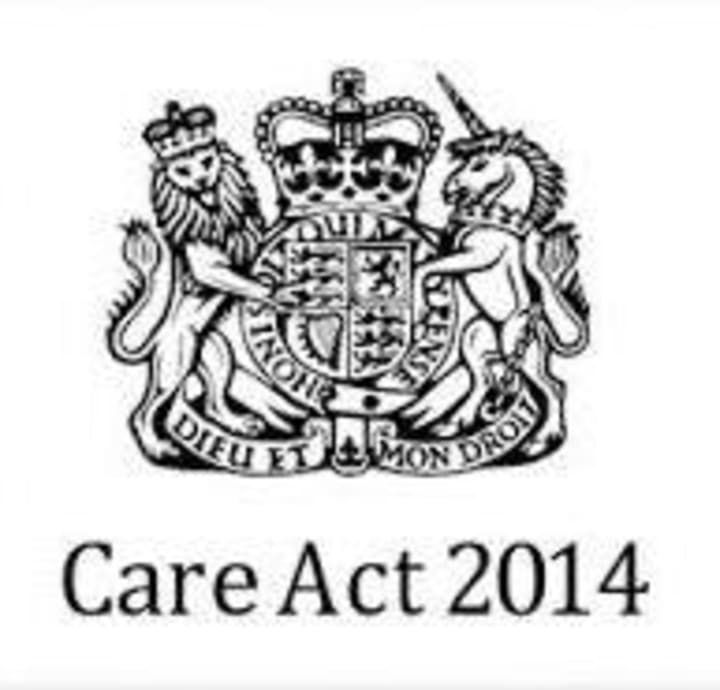HELP! My parents are elderly! - A beginners guide to Adult Social Care
Applicable to England, United Kingdom Only

Unfortunately, old age is something that is unavoidable for all of us. As we get older, so do our families and there may come a time in your grandparents', parents' or even your own life when you no longer feel able to cope alone. The purpose of this article is to explain what Adult Social Care is, the basic principles of the Care Act 2014 and what to expect.
What is Adult Social Care? What do they do?
Every Local Authority in England is required by law to provide services and support to local residents in need. Almost everyone has heard of Children's Social Services, Social Workers and what their role is in society. However, it can sometimes be a shock to people that there is also an Adult's Social Services, more commonly referred to as Adult Social Care or ASC. There are many different roles and departments within Adult Services, but their primary function is to support those with physical or mental disability, vulnerable adults suffering from abuse or neglect, those suffering from addiction and the elderly.
Different teams will work with different client bases (i.e. elderly people, people with learning difficulties, etc) and cover specific areas of the county. When working with Adult Social Care, I would recommend always making a note of the team who covers your local area. Those employed by Adult Social Care are normally support workers, administrative staff, higher management roles and Social Workers. Some authorities also employ 'Case Coordinators' or 'Social Work Practitioners', these roles refer to those who do similar roles to Social Workers, however do not usually hold a Social Work degree. All Local Authorities in England are required to follow the regulations and responsibilities set out in the Care Act, 2014.
Adult Social Care can support with identifying what support a person needs, sourcing the help that is needed and referring to outside organisations or services if necessary. All Adult Social Care support normally starts with an assessment. This can be very confusing for people as an 'assessment' sounds intimidating and complicated. An assessment is a written document which explains who the person is, a little about their experiences, what support they may need and if they are eligible for support from Adult Social Care.
Contacting Adult Social Care
The easiest way to contact Adult Social Care is normally by telephone. Each Local Authority will have the 'front door' or 'access' telephone number on their government website and there is normally an online form there as well. Other professionals (such as your GP or District Nurse) can support to contact Adult Social Care on your behalf if you are unable to do so yourself. The first step will be explaining you or your family's situation, what support you would like and establishing next steps. If you are contacting Adult Social Care on behalf of someone else, it is advisable to have discussed with that person that you want to contact ASC and have their permission to do so. Support and advice that can be provided by Adult Social Care without the permission of the person the situation involves is very limited, however if you are genuinely very worried about an adult it is best to contact services just in case. Anyone can contact Adult Social Care to discuss their own issues or concerns for a friend, neighbour or loved one. You do not need to be a professional to raise a concern.
The Care Act 2014, in a Nutshell

The Care Act 2014 came into effect in April 2015 and is all about adults with care and support needs as well as those that care for them. The Care Act replaces multiple pieces of legislation by bringing all relevant law together, ensuring that the law is clearer and easier for the public and Local Authorities to interpret. The Care Act 2014 focuses on wellbeing and sets out the Council's responsibilities to provide accessible support and services to vulnerable people.
Needs Assessment
When you first make contact with Adult Services, they will initially need to carry out a Needs Assessment. Whilst a needs assessment can sound daunting, it’s actually really simple. A needs assessment is essentially a conversation with the person who needs support, their family/friends and any other relevant parties (such as a doctor). This will give Adult Services an idea of the person’s experiences, their wishes and who they are as a person, as well as their needs and how these can be met. The worker will then complete a written report outlining all the information they have gathered - this document is known as a Needs Assessment. The person the needs assessment is about is able to request a copy which they can share with their family/friends should they choose to do so. A review of the Needs Assessment is typically carried out every year and the person's support changed as needed. Should significant change happen before a review is due, one can be requested from the Local Authority ahead of schedule.
Eligibility
Part of the Needs Assessment is to identify if the person is eligible for support. In order to be eligible, the adult's must meet three criteria. The first of which is that the adult's needs must be related to a physical or mental impairment. This includes physical disability, fragility due to old age, learning difficulties, significant illness, mental health difficulties, alcoholism or addiction.
The adult must be unable to or have difficulty doing two or more of the following;
- Managing and maintaining nutrition (preparing food/drinks and being able to eat them)
- Maintaining personal hygiene (including washing laundry)
- toileting independently
- being appropriately clothed (clean, weather appropriate clothing)
- making use of the home safely
- ensuring the home is habitable (relatively clean and able to access different rooms without falling over things)
- developing and maintaining relationships with friends or family
- accessing and taking part in work, training, education and volunteering (if the person wishes to do so)
- use public facilities or services, such as public transport, health services and recreation
- caring for a child
An d, because of this, there is likely to be a significant impact on the adult's health or wellbeing if they do not receive help.
Note - An adult is still classed as 'unable' to do the thing if doing it themselves causes them a lot of pain, discomfort or distress.
Mental Capacity
Under UK law, all adults have the right to make decisions for themselves - even if these decisions are unwise. Decisions can be made on someone else's behalf if they are deemed to lack 'mental capacity'. If a person's capacity is in doubt, a mental capacity assessment will be completed - this is normally done by a GP, Social Worker or other professional. The law regarding Mental Capacity and the assessment is set out in the Mental Capacity Act 2005. A person is deemed to lack capacity if they are unable to understand relevant information, unable to use the information to make a decision or unable to communicate this decision in some way. The person must have a mental or physical disturbance of the mind (i.e. dementia, significant learning difficulty or mental health problem) which is impacting their ability to make the decision. All possible steps need to be taken to enable the person to make their own decision, before making the decision on their behalf. When a person is unable to make their own decision; all decisions must be made in the person's best interest and take into account what their decision would have likely been had they not been unwell.
Carer's Assessment
A Carer’s Assessment is similar to a Needs Assessment, however it is designed to identify how to support a person who is the main carer for another. This is normally a family member or friend who offers support informally and without financial or other reimbursement. If you or someone you know is providing care to a partner, elderly relative or someone with a disability you can ask the local authority for support with this. The support offered can vary greatly between local authorities, such as one of payments, providing a “sitting service” for those who cannot be left alone safely or providing support with some aspects of caring for the individual. It is advised to get in touch with your own local authority to enquire as to what help is available.
Finances and Financial Threshold
Once the Needs Assessment is completed and it has been identified that the person is eligible for support, the conversation then turns to whom will pay for that support. This largely depends on your own financial circumstances.
If the adult has over £23,250 in savings, the Local Authority will not pay for the care. The Local Authority will still complete an assessment and advise what care would be suitable and can help to arrange the care, however the person will be expected to pay for their care out of their savings. Once the person has savings less than £23,250, then the Local Authority will step in to support. This becomes more complicated if the person owns a home and now requires residential care, as the value of the house may be taken into account as well as savings. This will need to be discussed with the Social Worker in charge of your case as this will largely depend on your own family's circumstances and whether anyone else lives in the property.
If the person has no savings or savings below the threshold, the Local Authority will carry out what is called a financial assessment. This looks at everything the person has coming in, such as benefits, pensions and any other sources of income. They will then deduct the person's usual outgoings from this; such as rent, utilities and other costs to determine how much the person can afford to contribute towards their care. The cost of in home care is normally around £20 per carer per hour, but this can vary between areas. In some cases, you will be assessed as being able to afford more than the total amount of care. This is especially likely if only small amounts of support are needed. If this is the case, your Social Worker will advise you of this and suggest that the person pays the Carers directly as this will work out cheaper. However, if the person's needs increase so will the cost of care meaning the Local Authority will need to be re-involved.
In most cases, the Local Authority end up paying the majority of the costs due to financial assessments identifying that people do not have the funds required available. However, this will depend on how much income the person has compared to their outgoings. The more money coming in, the more you are expected to contribute towards the costs.
Meeting Assessed Needs
- For more information about the Care Act 2014, please click here: https://www.legislation.gov.uk/ukpga/2014/23/contents
What are the options?
Care at Home
Care at home is one of the most common choices in terms of support and is often called a 'package of care'. These can vary from a visit or multiple visits per day, to overnight and even 24hour care depending on the person's needs. Care at home can be sought privately as well as through Adult Services which gives you more choice over how many hours you would like and what agency you'd prefer. When services are being provided by the Local Authority, choice can be limited as the Local Authority has to be fair to all care businesses, consider the cheapest yet effective option and is unable to pick and choose.
Residential and Nursing Care
Residential and nursing placements are for people whose needs are so significant that they require 24/7 care and are unlikely to be able to keep themselves safe if they were to remain at home. A person must be assessed as needing this level of care to be offered support from the Local Authority in obtaining it and the person themselves will need to be in agreement, unless they have been assessed as lacking mental capacity. You cannot go into residential care simply because you feel you are that age where you would like to do this, unless you have the financial means to pay for this privately. Nursing settings are for people with higher care needs such as extensive medical difficulties and require regular input from health professionals. Residential placements do not routinely have a nurse on staff, whereas nursing homes do.
If the person requires residential or nursing care, the Local Authority are able to support with costs should the person not have the means to cover it. The majority of residential placements are upwards of £500 a week, therefore even those with savings are unlikely to be able to cover full costs for the entirety of their care. Any income the person has, such as a pension, will also need to contribute towards these costs. As with any care and support, you are expected to cover the costs yourself if you have the means to do so - this includes any property you might own which may have to be sold to pay for care. This is more complicated if someone else is living in the property and should be discussed with your own Social Worker, as your family's own individual circumstances will depend on the options available to you.
Volunteers and Charities
In every area there are a multitude of volunteer organisations and charities that provide support. This can vary between support with shopping, caring for pets and just providing some company. This again varies greatly between areas, however Age UK is a good place to start when seeking support and are generally able to point you in the right direction for the help you need. Covid-19 has had a significant impact on these services and during lockdowns many services are no longer available. It is advised to contact local charities to discuss what is still available. You are able to seek support from charities with or without the support of a Social Worker, however your worker may have a better knowledge of what is available in your area. The majority of charities and volunteer organisations provide their support with no or very little cost, therefore may be a preferred option for those who do not yet want to purchase or contribute towards care.
Disclaimer: *** This article is created for easy accessible information purposes only and to give a basic understanding of Adult Social Care and some available services. This article does not constitute professional advice, does not cover all options and cannot replace speaking to a professional. Information in this article cannot overrule information or advice provided by a professional. Please if you have concerns regarding yourself or a loved one, contact your Local Authority for information and advice. The number for this can normally be found on your Local Authority's website.
All information contained in this article is factually correct at the time of publication;; June 2021.
About the Creator
The 'A' Girl
'Monsters are real, and ghosts are real too. They live inside us, and sometimes, they win.' — Stephen King
"Sometimes, all you can do is lie in bed, and hope to fall asleep before you fall apart." - William C. Hannan






Comments
There are no comments for this story
Be the first to respond and start the conversation.